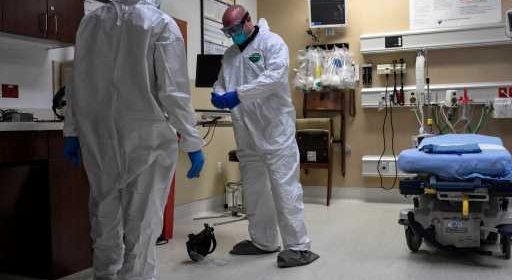More Coloradans hospitalized with COVID than at any point in 2021

Colorado’s COVID-19 hospitalizations are higher than they’ve been at any time since we bid 2020 a less-than-fond farewell, and about 90% of intensive-care beds in the state are full.
As of Thursday, 982 people were hospitalized with confirmed cases of COVID-19, which was the highest number since Dec. 31. At the peak on Dec. 2, there were 1,841 people hospitalized with confirmed cases.
Scott Bookman, the state’s COVID-19 incident commander, asked anyone who is eligible and hasn’t gotten vaccinated to get the COVID-19 and seasonal flu shots, to reduce strain on hospitals.
About 78% of people hospitalized for COVID-19 in Colorado are unvaccinated.
Two weeks ago, Colorado had about 166 new cases for every 100,000 people, and was doing better than the majority of states, state epidemiologist Dr. Rachel Herlihy said. As of Thursday, the rate had increased to 268 cases per 100,000 people, which was the 14th-highest rate in the country, she said.
That reflects both increasing cases in Colorado and an improving situation in the South.
“That’s a really significant change for us,” she said during a news briefing Friday.
New cases rose 16% last week, after climbing 5% the week before, Herlihy said. There’s some indication this week might be a bit better, but it’s going to take several weeks of steady improvements before Colorado can say the worst is over, she said.
While Herlihy still referred to the situation as a high plateau, she acknowledged recent increases could be the start of another spike. Generally, respiratory viruses spread more efficiently in the winter, though SARS-CoV-2 hasn’t always played by those rules, she said.
“This is one of those cases where my epi(demiology) crystal ball isn’t very clear,” she said.
Cases are highest in children between 6 and 11, who aren’t eligible for vaccination, and those between 12 and 17, who are, Herlihy said. They’re also particularly increasing on the Eastern Plains, in the southwest counties and in the San Luis Valley, she said.
Bookman urged people who haven’t been vaccinated to either get the Pfizer shot by Thursday or the Johnson & Johnson shot by Nov. 11 to ensure they’re fully protected by Thanksgiving. It takes about two weeks after the final shot for the body to mount an immune response.
“We really want to make sure people are thinking ahead,” he said.
The Centers for Disease Control and Prevention recommends that unvaccinated people get tested in the days before and after they travel, or put off nonessential trips. All people need to monitor themselves for symptoms and wear masks in indoor spaces, like airports and trains, the CDC said.
People can also protect themselves by wearing masks and practicing social distancing during their gatherings; moving events outside or opening windows to increase ventilation; requiring everyone to get tested in advance; limiting gatherings to vaccinated adults; and hosting smaller events, Herlihy said.
“We want individuals to protect themselves, protect their families,” she said.
Source: Read Full Article